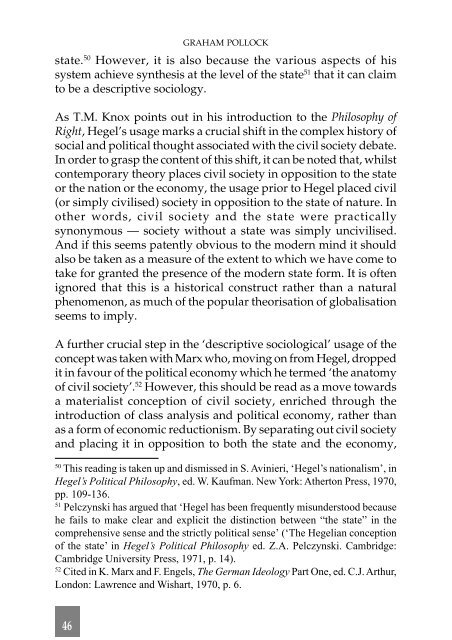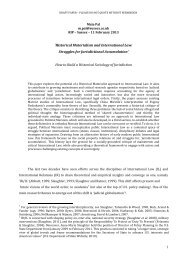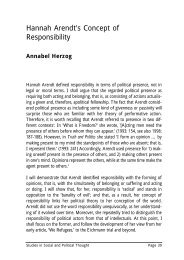Civil Society Theory and Euro-Nationalism - University of Sussex
Civil Society Theory and Euro-Nationalism - University of Sussex
Civil Society Theory and Euro-Nationalism - University of Sussex
You also want an ePaper? Increase the reach of your titles
YUMPU automatically turns print PDFs into web optimized ePapers that Google loves.
46<br />
GRAHAM POLLOCK<br />
state. 50 However, it is also because the various aspects <strong>of</strong> his<br />
system achieve synthesis at the level <strong>of</strong> the state 51 that it can claim<br />
to be a descriptive sociology.<br />
As T.M. Knox points out in his introduction to the Philosophy <strong>of</strong><br />
Right, Hegel’s usage marks a crucial shift in the complex history <strong>of</strong><br />
social <strong>and</strong> political thought associated with the civil society debate.<br />
In order to grasp the content <strong>of</strong> this shift, it can be noted that, whilst<br />
contemporary theory places civil society in opposition to the state<br />
or the nation or the economy, the usage prior to Hegel placed civil<br />
(or simply civilised) society in opposition to the state <strong>of</strong> nature. In<br />
other words, civil society <strong>and</strong> the state were practically<br />
synonymous — society without a state was simply uncivilised.<br />
And if this seems patently obvious to the modern mind it should<br />
also be taken as a measure <strong>of</strong> the extent to which we have come to<br />
take for granted the presence <strong>of</strong> the modern state form. It is <strong>of</strong>ten<br />
ignored that this is a historical construct rather than a natural<br />
phenomenon, as much <strong>of</strong> the popular theorisation <strong>of</strong> globalisation<br />
seems to imply.<br />
A further crucial step in the ‘descriptive sociological’ usage <strong>of</strong> the<br />
concept was taken with Marx who, moving on from Hegel, dropped<br />
it in favour <strong>of</strong> the political economy which he termed ‘the anatomy<br />
<strong>of</strong> civil society’. 52 However, this should be read as a move towards<br />
a materialist conception <strong>of</strong> civil society, enriched through the<br />
introduction <strong>of</strong> class analysis <strong>and</strong> political economy, rather than<br />
as a form <strong>of</strong> economic reductionism. By separating out civil society<br />
<strong>and</strong> placing it in opposition to both the state <strong>and</strong> the economy,<br />
50 This reading is taken up <strong>and</strong> dismissed in S. Avinieri, ‘Hegel’s nationalism’, in<br />
Hegel’s Political Philosophy, ed. W. Kaufman. New York: Atherton Press, 1970,<br />
pp. 109-136.<br />
51 Pelczynski has argued that ‘Hegel has been frequently misunderstood because<br />
he fails to make clear <strong>and</strong> explicit the distinction between “the state” in the<br />
comprehensive sense <strong>and</strong> the strictly political sense’ (‘The Hegelian conception<br />
<strong>of</strong> the state’ in Hegel’s Political Philosophy ed. Z.A. Pelczynski. Cambridge:<br />
Cambridge <strong>University</strong> Press, 1971, p. 14).<br />
52 Cited in K. Marx <strong>and</strong> F. Engels, The German Ideology Part One, ed. C.J. Arthur,<br />
London: Lawrence <strong>and</strong> Wishart, 1970, p. 6.
















